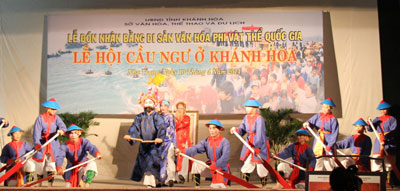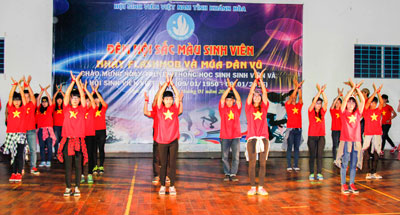
According to the international scientific seminar on protection and promotion of Vietnam's sea and island culture values which has just been held in Nha Trang City, it is necessary to identify the sea and island culture to preserve and uphold these cultural values.
According to the international scientific seminar on protection and promotion of Vietnam’s sea and island culture values which has just been held in Nha Trang City, it is necessary to identify the sea and island culture to preserve and uphold these cultural values.
Through 60 speeches presented at the seminar, the domestic and international scholars from Russian Federation, Japan, South Korea, Australia, Demark, Taiwan, Sweden, etc. posed the problems and different approaches to the sea and island culture as well as proposed some methods to effectively preserve and bring into play Vietnam’s sea and island culture values.
 |
| Fish Worshipping Festival, unique cultural characteristic of coastal communities. |
Vietnam has a long coastline of over 3,200km, 28 coastal provinces and cities with more than 1,000 national-level beautiful sites. Many marine reserves and national biosphere reserves as well as numerous islands and bays have created many favorable conditions for Vietnam to develop coastal tourism. Besides, the coastal communities with 195 traditional festivals have become a typical, special cultural characteristic of Vietnam.
However, that long-standing sea and island culture has not been researched adequately. According to Vu Minh Giang, Professor, Doctor of Science and Deputy Chairman of Vietnam National Cultural Heritage Council, the study of the sea and island cultural heritages in Vietnam have been spontaneous; the preservation of these heritages has mainly depended on the programs and activities of the localities and communities. Therefore, it is urgent to make plans, collect, systematize and digitize the materials of sea and island culture on the national scale; legitimize and internationalize the valuable heritages; focus on underwater archaeology.
Other speeches posed problems on different aspects relating to the sea and island cultural values, including the methods to approach and identify the sea and island culture; build lifestyle and enhance the adaptation of the coastal communities to cope with climate changes; potential, advantages and values of sea and island culture in Khanh Hoa Province, and so on.
Many coastal localities have attached special importance to the management of sea and island cultural heritages as well as the roles of sea and island culture in the economic and social development, such as Da Nang, Quang Nam, Khanh Hoa, Binh Thuan, Phu Quoc (Kien Giang), Ly Son Island (Quang Ngai), Ha Long Bay (Quang Ninh), Cat Ba Islands (Hai Phong).
At the seminar, the scholars from Russian Federation, Canada, Nigeria, Japan, South Korea, Taiwan, Sweden, etc. shared their experience in researching, protecting and upholding the sea and island cultural values.
The researchers and scientists also pointed out some drawbacks and proposed some solutions in studying and promoting the sea and island cultural values and upholding its role in the development of economy, society and tourism.
Reportedly, the ideas and speeches presented at the seminar will be disseminated in order to increase the awareness of the authorities at all levels and coastal communities about the protection and promotion of the sea and island cultural values.
H.N









